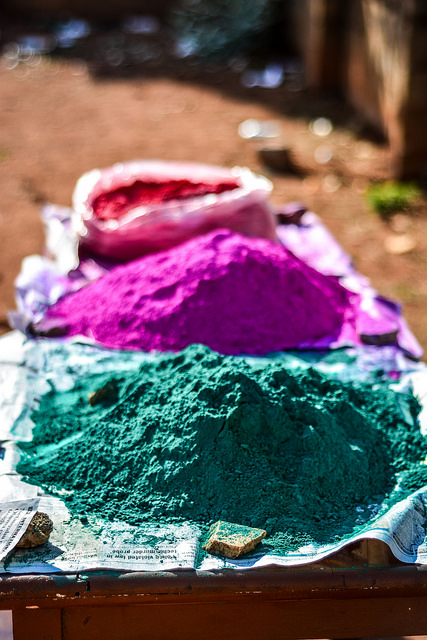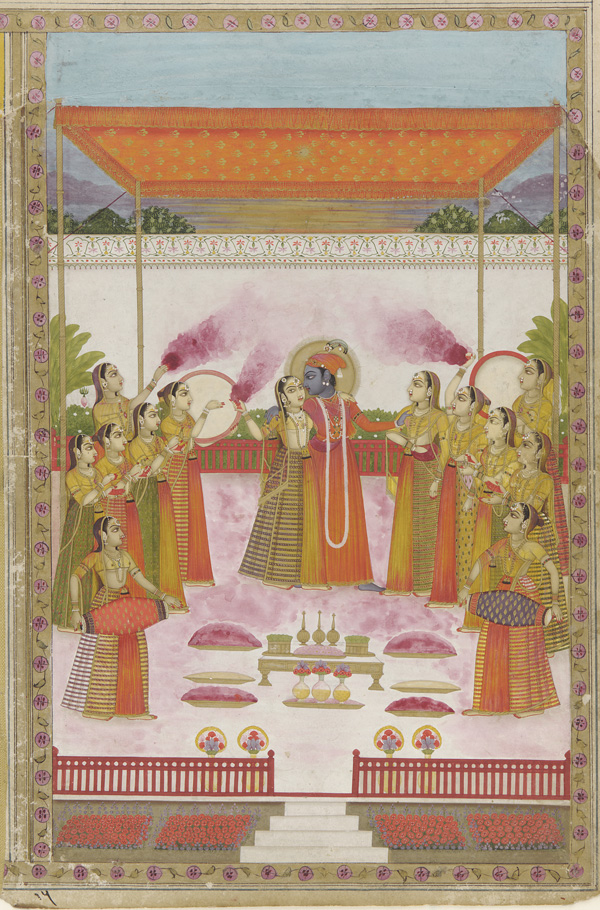Holi Hai! Posted by Rachael on Apr 10, 2018 in Hindi Language
In honor of the increasingly popular festival, Holi (होली), now celebrated worldwide, I’ve dedicated this blog to the subject. Although Holi typically occurs in late February to early March, or the month of Phalgun (फाल्गुन) according to the Vikram Samvat Hindu calendar, it’s better late than never to talk about this popular and exuberant festival! Read the dialogue below between an American Hindi student visiting Jaipur and her host mother about the cultural history of this festival.
एमिली: होली के दिन आनेवाले हैं, न केया जी?
(Emily: Holi is coming soon, isn’t it Keya ji?)
केया जी: हाँ, तुम्हारी बात सही है । यह तुम्हारी पहली होली होगी?
(Keya ji: Yes, you’re right. Will this be your first Holi?)
एमिली: जी हाँ, लेकिन मैं होली के बारे में बहुत कम जानती हूँ । आप मुझे कुछ बता सकती हैं होली के बारे में ?
(Emily: Yes, (ma’am), but I know very little about Holi. Can you tell me a bit about it?)
केया जी: ज़रूर बेटा । ख़ैर, होली के पहले दिन, जो रंगवाले दिन से पहले आता है, हम छोटी होली या होलिका दहन मनाते हैं । इस के कुछ हफ़्ते पहले हम लकड़ियाँ इकट्ठा करते हैं और होलिका का पुतला बनाते हैं ताकि इस दिन हम इसे आग में जला सकें । हम इस कॉलोनी में एक ही बड़ी आग जलाते हैं और कॉलोनी के सब लोग साथ साथ गाने गाते हैं और इसी तरह होलिका दहन मनाते हैं ।
(Keya ji: Of course, dear. Well, on the first day of Holi, which comes before the “colors” day, we celebrate “Small Holi” or “The Burning of Holika.” Some weeks before this, we gather wood (fuel) and we make an effigy of Holika so that, on this day, we can burn this effigy in the fire. In this colony, we light one big fire and everyone in the colony sings songs together and, in this way, we celebrate “The Burning of Holika”).
एमिली: अच्छा, बड़ा दिलचस्प है । लेकिन, एक बात है जो मेरी समझ में नहीं आयी – होलिका कौन है? मैंने उसके बारे में कभी नहीं सुना है ।
(Emily: Ok, very interesting. But, there’s one thing I didn’t understand – who is Holika? I’ve never heard about her).
केया जी: सच में? अच्छा, ख़ैर होलिका को लेकर एक पूरानी कहानी है जिसमें हिंदू लोग विश्वास रखते हैं । यह है कि बहुत पहले, एक राजा था जिसका नाम हिरण्यकशिपु। लेकिन, हम कह नहीं सकते कि वह अच्छा राजा था, वह असुरों का राजा था । उसे तपस्य करते करते एक बहुत बड़ा वरदान मिला और यह था कि आगे चलकर उसकी पाँच क्षमताएँ होंगी: न मर्द न जानवर उसे मार सकता, न भीतर न बाहर, न दिन में न रात को, न अस्त्र (airborne weapon) से न शस्त्र (handheld weapon) से, न धर्ति पे न हवा में न पानी में । इस का मतलब है कि वह सोचने लगा कि ‘मैं भगवान हूँ’।
(Keya ji: Really? Ok, well, regarding Holika there’s an old story that Hindus believe in. The story goes that, a long time ago, there was a King whose name was Hiranyakashipu. But, we can’t say that he was a good King: he was the King of the asuras (a type of demon). After doing a lot of penance, he received a great boon, which was that, in the future, he would have five powers (capabilities): neither man nor beast could kill him, neither inside nor outside, neither in the daytime nor at night, neither by airborne weapon nor handheld weapon, neither on the earth, nor in the air, nor in water. This meant that he began to think he was God).
एमिली: अच्छा, बहुत दिलचस्प है, फिर क्या हुआ ?
(Emily: Ok, very interesting, then what happened?)
केया जी: फिर, हालाँकि राजा बहुत शक्तिशाली हो गया था, फिर भी उसका बेटा, प्रह्लाद, विष्णु ही की पूजा करता रहता था; वह मानता था कि विष्णु ही भगवान थे और कोई और विष्णु की जगह कभी नहीं ले सकता । बदला लेने के लिये, राजा अपने बेटे को बहुत सारी क्रूर सज़ाएँ देता था । होलिका, राजा की बहन, जो मानती थी कि अपना भाई ही पूजा-प्रार्थना के लायक था, उसने फैसला किया कि मैं प्राह्लाद को धोका दूँगी । एक दिन, होलिका किसी तरह प्राह्लाद को अपनी गोद में लेकर चिता में बैठ गयी । लेकिन उस जवान को पता नहीं था कि होलिका एक चादर पहनी थी जो जला नहीं सकती और इसी तरह चादर उसकी रक्षा करती थी । फिर, अचानक, आग में होलिका से चादर उड़ दिया और प्राह्लाद इस में लिपटा हो गया । होलिका मर गयी और प्राह्लाद बच गया, अपने विश्वास की वजह से । फिर, विष्णु, अपने नरसिंह के अवतार लेकर (जो आधा मर्द और आधा सिंह या शैर है), सांझ में, दहलीज़ पे, राजा को अपनी गोद में लेकर अपने शैर के नखरों से मार डाले । इस तरह से, राजा मर गया हालाँकि उसकी बहुत सारी क्षमताएँ थीं ।
(Keya ji: Then, even though the King had become very powerful, still his son, Prahlada, kept worshipping only Vishnu; he believed that Vishnu alone was God and no one else could take his place. To take revenge (for this), the King subjected his son to many cruel punishments. Holika, the King’s sister, who thought that her brother alone was worthy of worship and prayer, decided that she would deceive Prahlada. One day, Holika somehow took Prahlada in her lap and sat down in a pyre. But, that young man didn’t know that Holika was wearing a blanket (or cloak) that could not be burnt and, in this way, the blanket (or cloak) protected her. But, suddenly, the cloak flew off Holika in the fire and became wound around Prahlada. Holika died and Prahlada was saved because of his faith. Then, Vishnu, assuing the avatar of Narasimha (half man-half lion), in the evening, on a threshold, took the King in his lap and, with his lion’s claws, killed him. In this way, the King died even though he had many powers).
एमिली: यह कहानी बहुत अच्छी लगती है मुझे । लेकिन, इसका मतलब क्या है ?
(Emily: I really like this story. But, what does it mean?)
केया जी: इस का मतलब है कि हम सब को प्राह्लाद की तरह होने की कोशिश करनी चाहिए क्योंकि वह, उसके विश्वास की वजय से, मरने से बच गया । एक और बात है कि किसी को कभी नहीं सोचना चाहिये कि “मैं भगवान हूँ” या भगवान के जैसा हूँ क्योंकि असली भगवान तुमको सख़्त सज़ा देंगे ताकि वे तुम्हें याद दिलाये कि तुम सिर्फ़ इंसान हो, और इंसान ही रहोगे । इस का मतलब यह भी है कि होली के दिन हम अच्छाइयाँ मनाती हैं, खासकर के अच्छाइयों की विजय बुराइयों के ऊपर ।
(Keya ji: This means that we all should try to be like Prahlada because he was saved from death due to his faith. Another thing is that no one should ever think “I am God,” or “I am like God” because the real God will give you a harsh punishment so that he may remind you that you are only human and you will remain so. This also means that, on the day of Holi, we celebrate goodness, especially the triumph/victory of good over evil).
एमिली: क्या बात है! मैं अपने अमेरिकन दोस्तों को ज़रूर यह कहानी सुना दूँगी । अमेरिका में कॉलेज वाले छात्र होली मनाते हैं, लेकिन मुझे लगता है कि यह होली भारतीय होली से बहुत अलग है ।
(Emily: Wow! I will definitely tell my American friends this story. In America, college students celebrate Holi, but I think this Holi is very different from the Indian one).
केया जी: हाँ, बेटा, सही कहा तुमने । यह असली होली नहीं है जब लोग सिर्फ़ दूसरों को गुलाल और पिचकारियों से छेड़ छाड़ करते हैं, बिना इतिहास, संस्कृति या धर्म के । बॉलिवुड की फ़िल्मों में होली वाले गाने बहुत आम हैं और, आम तौर से, इन की अहमियत है प्यार, आकर्षण और इश्कबाज़ी से जुड़ी है और यह बुरी बात नहीं । लेकिन लोग जो दूसरी संस्कृति से त्यौहार अपने ही इस्तेमाल के लिए लेते हैं बिना समझे कि यह त्यौहार कैसे मनाया जाता है, इसका मतलब क्या है, इसका इतिहास क्या है, मुझे इस से बड़ा एतराज़ है । ख़ैर, तुम मेरी बड़ी बड़ी बातों से तंग आ चुकी होगी; आओ बेटा, होली की तैयारियाँ कर लें !
(Keya ji: Yes, dear, you’re right. This isn’t the “true Holi”–when people harass each other with colored water and water guns, without history, culture or religion (involved). In Bollywood movies, Holi songs are very common and, usually, their significance has to do with love, attraction and flirtation – this isn’t a bad thing. But, people who take a festival from another culture, without understanding how this festival is celebrated, its meaning, its history, I object to this. Well, you’ve most likely become sick of my “heavy words”; come, dear, let’s make some preparations for Holi!)
एमिली: जी हाँ, ज़रूर, आपकी मदद कर दूँगी ।
(Emily: Yes (ma’am), certainly, I will help you).
| गुलाल/gulaal (masc. noun) | Colored powder, often mixed with water, that Holi participants throw at one another. |
| पिचकारी/pichkaari (fem. noun) | Water gun with which Holi participants spray each other. |
| मनाना/manaanaa (verb) | To celebrate. |
| रंग/rang (masc. noun) | Color. रंगीन/rangeen=colorful. रंगवाला/rangvaalaa=the colorful one. |
| होलिका/holikaa and होलिका दहन/holikaa dehen (masc. noun) | Holika, the evil aunt of Prahlada who tricked him into sitting on a pyre with her only to be burnt alive, while he remained unscathed, thanks to his unrelenting devotion to Vishnu. Holika Dehen is the first day of Holi, or छोटी होली, on which an effigy of Holika is burnt. |
| जलाना/jalaanaa (verb) | To burn. जलना/jalnaa=to be burned. |
| होली खेलना/holi khelnaa (verb) | To "play" Holi. |
| इश्क़बाज़ी/ishqbaazi (fem. noun) | Flirtation. |
| भगवान/bhagvaan (masc. noun) | God. |
| विश्वास/vishvaas (masc. noun) | Faith or belief. |

Build vocabulary, practice pronunciation, and more with Transparent Language Online. Available anytime, anywhere, on any device.






